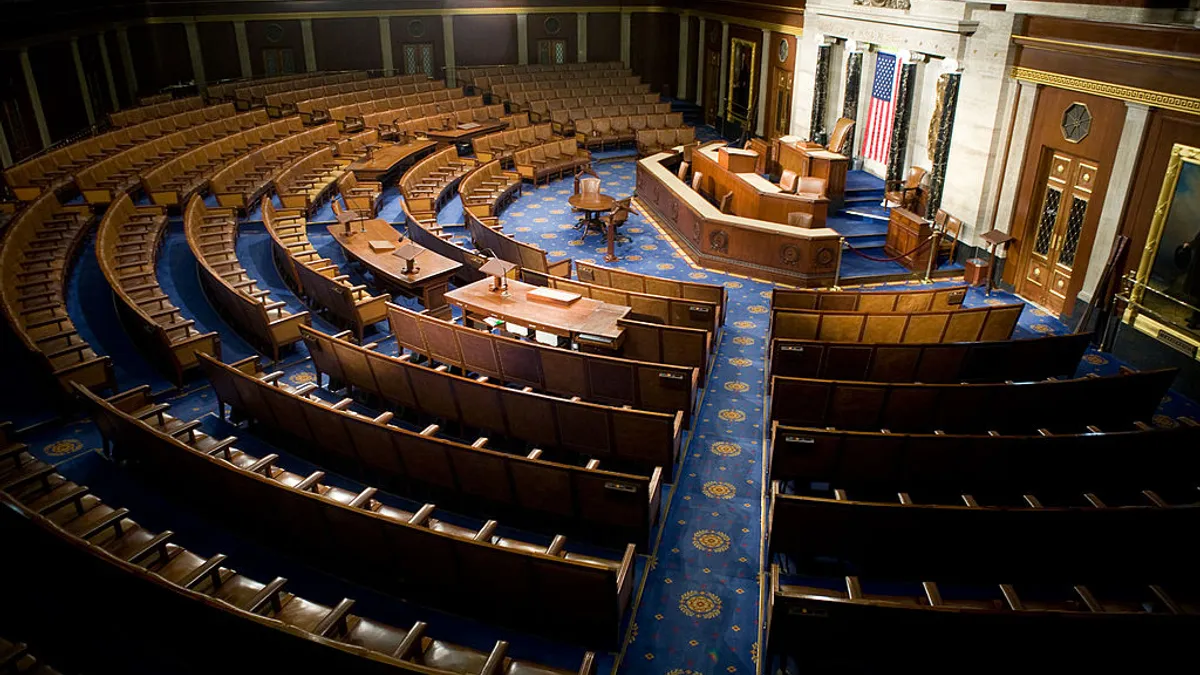Dive Brief:
-
The U.S. Department of Education's Title IX rule protecting LGBTQI+ students hit additional roadblocks this week, both in Congress and in a court case challenging the rule.
-
On Thursday, the House voted 210-205 along party lines to pass a joint resolution invoking the Congressional Review Act, which allows Congress to overturn the Title IX rule and give federal lawmakers 60 congressional days to rescind or approve it. The resolution's passage immediately sparked outcry from LGBTQ+ and civil rights organizations that favor the rule.
-
Meanwhile, on Wednesday, a federal district court judge rejected the department's request to keep parts of its final Title IX rule in place as it appeals its case to the 6th U.S. Circuit Court of Appeals. The Kentucky district court's decision to deny the department's motion for a partial stay pending appeal comes after the same court issued a preliminary injunction blocking the rule last month.
Dive Insight:
Pushback was expected from both the federal legislative and judicial branches in response to the Biden administration's decision to protect LGBTQI+ students under the anti-sex discrimination civil rights law.
Even prior to the rule's draft release in April, Republican state attorneys general had warned the U.S. Department of Education to stop its efforts or risk being sued. In the weeks after the department's April release of the final rule — which is set to go in effect Aug. 1 — Republican leaders mobilized through multiple lawsuits in the federal court system and in Congress through the Congressional Review Act.
And while the CRA measure is unlikely to reach the president, federal courts have already temporarily blocked the controversial rule from taking effect in at least 14 conservative states. They include Tennessee, Kentucky, Ohio, Indiana, Virginia and West Virginia — the states covered in the department's motion for a partial stay while it appealed the preliminary injunction.
School districts in most states, however, are still bound by the final Title IX regulations taking effect Aug. 1.
By 2021-22, the 28-year-old Congressional Review Act had been used to overturn 20 rules, one in the 107th Congress (2001-2002), 16 in the 115th Congress (2017-2018), and three in the 117th Congress (2021-2022), according to the Congressional Research Service.
However, even if Congress passes the CRA resolution in response to the Title IX rule, President Joe Biden said in a statement on Monday that he would veto the resolution and allow the rule to go through. The Office of Management and Budget, which reviewed the rule prior to its release, said the administration "strongly opposes" the joint resolution and that the rule is "critical to ensuring that no person experiences sex discrimination at school."
The Senate's version of the joint resolution has not moved since June, when it was referred to the Committee on Health, Education, Labor, and Pensions.
Meanwhile, in Wednesday's decision denying the partial stay, Chief Judge Danny Reeves of the Eastern District of Kentucky said the the Education Department "fails to rebut the myriad substantive and procedural flaws with the Final Rule as discussed at length by the plaintiffs."
On the other hand, Reeves said, the conservative states "made a strong showing that granting a stay would result in substantial and immediate harm to the States, their educational institutions, and all those who rely on the services they provide." Reeves also cited "the public interest in … avoiding unnecessary upheaval in schools."
The lawsuits challenging the Title IX rule, many of which claim the department overstepped its authority, are further bolstered by the U.S. Supreme Court's recent decision to overturn the Chevron doctrine. Until last month, the doctrine gave agencies wide powers to interpret and apply laws like Title IX. However, the high court diminished that power, jeopardizing numerous federal agency actions when it said that power ultimately lies with the courts.














